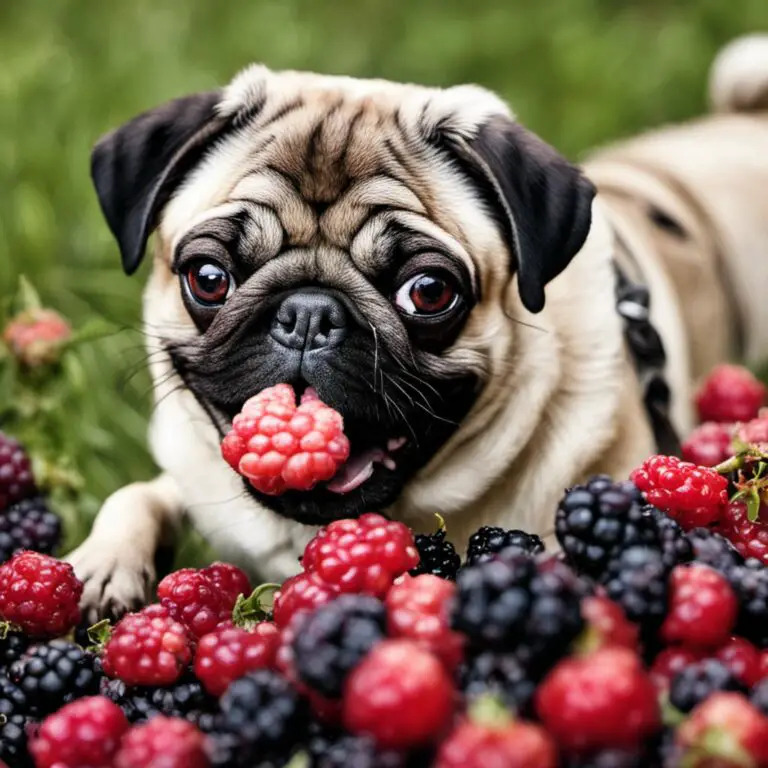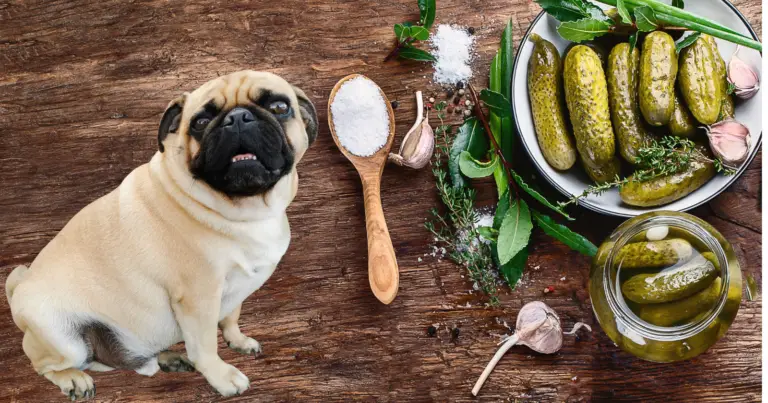Can Pugs Eat Spinach? A Nutritional Guide for Owners
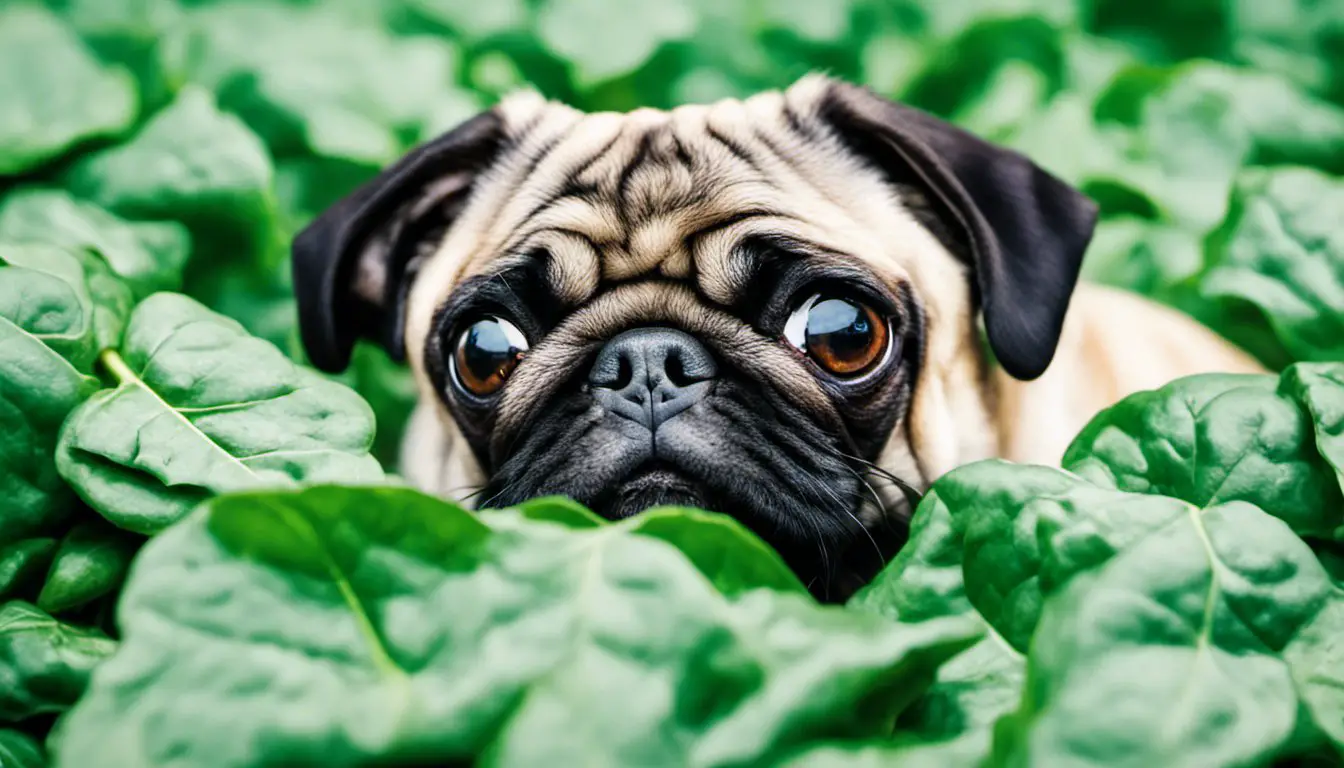
As a pug owner, you may have wondered, Can Pugs Eat Spinach? Is it a safe and healthy addition to your furry friend’s diet? It’s a nutritious vegetable packed with vitamins and minerals, and knowing whether your pug can benefit from this leafy green is important.

The good news is that pugs can eat spinach safely, but it should be fed to them in moderation because spinach is high in oxalic acid, which can cause kidney damage when consumed in large amounts. When fed properly, spinach can provide your pug with essential nutrients like vitamins A, B, C, and K, iron, and antioxidants.
It’s crucial to know the potential risks and benefits of any human food you share with your pug. While spinach can be a healthy treat for them, always monitor their intake and consult your veterinarian if you have any concerns about your pug’s dietary needs.
Contents
Table of Contents
Can Pugs Eat Spinach?

Yes, pugs can safely eat spinach, but you must feed it to them in moderation. Spinach is high in oxalic acid, which can cause kidney damage if consumed in large quantities source. As a responsible pug owner, you should know the proper preparation and serving size before incorporating spinach into your pug’s diet.
Get The Free Food Eating Guide That Keeps My Pug Happy and Playful Even at 13 Years Old
100% Beginner Friendly & Lists Real Foods Your Pug Can Actually Eat!

To ensure that your pug consumes a safe and nutritious snack, it is best to serve steamed spinach. Avoid boiling spinach, as this process causes the vegetable to lose most of its nutrients. Raw spinach can be difficult for a dog to digest, making steamed spinach the most optimal choice. Remember not to add any spices, herbs, salt, or oil while preparing the spinach, as these ingredients can harm your pug source.
When introducing spinach to your pug’s diet, start with small portions and monitor your dog’s reaction to the new vegetable. If your pug tolerates it well, you can continue to include spinach as an occasional treat, but always in moderation to avoid health issues related to oxalic acid.
In addition to spinach, there are a variety of fruits, vegetables, and snacks that pugs can enjoy. Your pug’s diet should be well-balanced, focusing on high-quality protein sources, fruits, vegetables, and essential nutrients.
So, while your pug can enjoy spinach as a healthy treat, always remember to serve it steamed and in moderation. Taking these precautions can provide your furry friend with a nutritious and safe snack.
Health Benefits of Spinach for Pugs
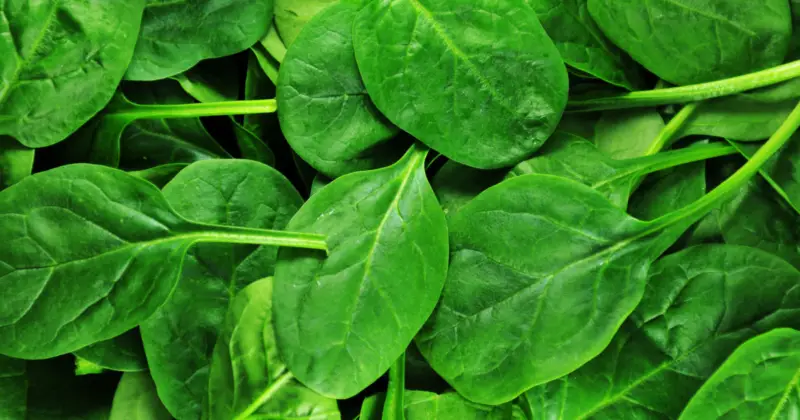
Rich in Vitamins and Minerals
Spinach is packed with essential vitamins and minerals contribute to your pug’s overall health. It contains vitamin A, which supports eye health, and vitamin C, an important antioxidant that helps prevent inflammation and cognitive aging in dogs. Moreover, spinach is a good source of vitamins B, K, iron, and calcium, all of which contribute to your pug’s well-being.
Low Calorie Snack Option
Spinach can be an excellent choice if you’re looking for a low-calorie and nutritious snack for your pug. It’s low in calories but still loaded with essential nutrients that help keep your dog healthy without causing weight gain. This makes it perfect for maintaining a balanced diet.
Promotes a Healthy Coat
The vitamins and minerals found in spinach can help promote a healthy coat for your pug. Vitamin A, in particular, benefits the skin by supporting cell growth and repair. Including spinach in your pug’s diet can help maintain their coat’s shine and overall skin health.
Improves Digestion
Spinach contains a considerable amount of dietary fiber, which aids in your dog’s digestion and supports healthy bowel movements. This can be especially beneficial for pugs that may experience constipation or other digestive issues. However, make sure to introduce spinach gradually, as too much fiber may lead to diarrhea.
Strengthens the Immune System
The antioxidants, vitamins, and minerals in spinach strengthen your pug’s immune system. Vitamin C, for example, is known to help prevent inflammation and support immune function. By including spinach in your dog’s diet, you can help them maintain a robust immune system and overall good health.
Potential Dangers of Spinach to Pugs
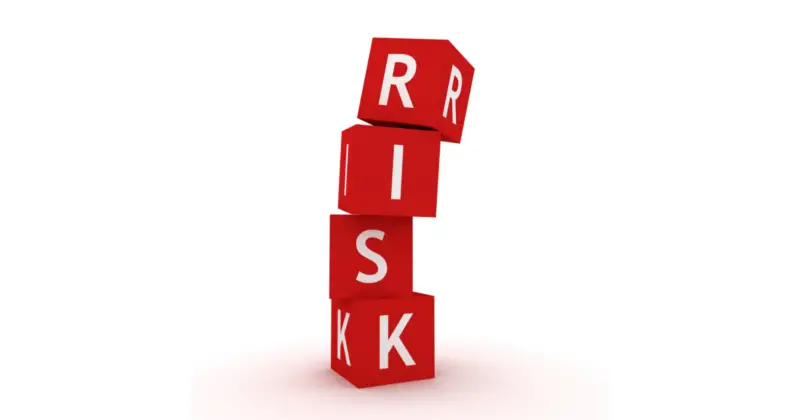
Possible Kidney Damage
While spinach can be a healthy treat for your pug, keeping the serving size small and infrequent is essential. Spinach is high in oxalic acid, which can lead to kidney damage if consumed excessively. Oxalates can cause kidney stones, which could ultimately result in kidney failure if not addressed.
Gastrointestinal Issues
Feeding your pug too much spinach may cause gastrointestinal discomfort. Symptoms such as diarrhea and vomiting can indicate that your pug has consumed too many oxalates. To avoid these issues, only feed your pug small portions of spinach and monitor their reaction.
Respiratory Paralysis and Muscle Weakness
High concentrations of oxalic acid may lead to muscle weakness and respiratory paralysis in extreme cases. While this is rare, being cautious and aware of the risks associated with overfeeding spinach to your pug is crucial. Always ensure their diet is balanced and includes a variety of dog-safe fruits and vegetables.
Risk of Heart Disease
While spinach is packed with nutrients that can benefit your pug, excessive consumption may result in abnormal heart rhythms and an increased risk of heart disease. The oxalic acid found in spinach can bind with minerals such as magnesium and calcium, leading to an imbalance in your pug’s mineral intake. This can affect their heart health, so moderation is key when feeding spinach to your pug.
Preparation of Spinach for Pugs
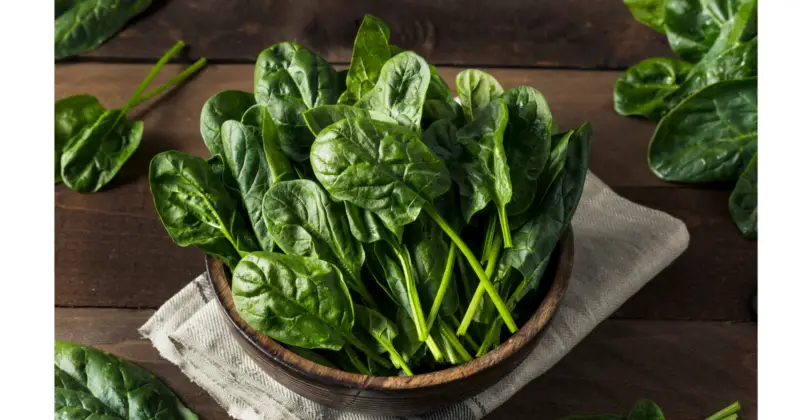
Chopped or Whole
When preparing spinach for your pug, it’s best to chop the leaves into smaller pieces. This makes it easier for your dog to chew and digest the spinach, reducing the risk of choking and ensuring they can benefit from the nutrients within the leaves.
Boiled, Steamed, or Raw
While raw spinach is hard for dogs to digest, boiling it can lead to nutrient loss. Therefore, the optimal choice is to steam the spinach for your pug. Steaming preserves vital vitamins and minerals like vitamins A, B, C, and K, iron, and calcium, boosting your dog’s immune system and improving digestion.
Without Added Spices or Seasonings
It’s important to avoid adding any spices, herbs, salt, oil, or other seasonings to the spinach you serve your pug. These additional ingredients can harm your dog or cause stomach upset and other health issues. Simply steam the chopped spinach and serve it plain to provide a healthy, nutritious treat for your pug.
Other Healthy Food Options for Pugs
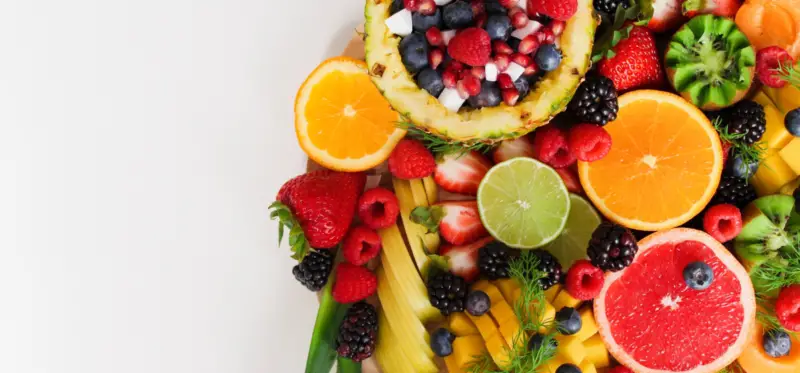
Fruits
Fruits can be a great addition to your pug’s diet, packed with essential vitamins and minerals. Some safe fruits for pugs include apples, strawberries, and blueberries. Make sure to remove any seeds or pits and feed them in moderation. However, avoiding fruits such as grapes, cherries, and avocados is important, as they can be toxic for dogs.
Vegetables
Vegetables are an excellent source of nutrients for your pug. Some examples of safe and healthy pug vegetables are carrots, kale, and green beans. However, ensure not to feed them green tomatoes, which can be harmful.
Some vegetables can be given raw or cooked, but avoid adding any oil or seasoning, as it can be unhealthy for your pug. As with fruits, remember to keep serving sizes small and avoid overfeeding.
Protein Sources
Protein is essential for maintaining muscle mass and overall health in pugs. Some great protein sources for pugs include lean meats like chicken, turkey, and beef. Fish and eggs are also acceptable, although they should be cooked thoroughly to avoid the risk of salmonella.
Cheese is another good protein source but should be fed in small amounts due to its potentially high-fat content. However, always consult your vet before introducing new protein sources to your pug’s diet.
Balanced Diet
It is important to provide your pug with a balanced diet by incorporating a variety of food options. A mix of high-quality dry dog food, protein sources, fruits, vegetables, and occasional treats will ensure that your pug receives all the necessary nutrients. Remember to keep food portions appropriate for their size and age, and consult your vet if you have any concerns about your pug’s diet.
To keep your pug healthy and happy, include a good mix of fruits, vegetables, and protein sources in their meals. Always be mindful of portion sizes, serve food in moderation, and seek veterinary advice when introducing new foods to their diet. With a well-balanced diet, your pug will thrive and enjoy the various flavors and textures that these food options provide.
Can Pugs Eat Spinach? How much spinach can you give a dog? Watch this
Foods to Avoid for Pugs
When feeding your pug, knowing which foods are safe and which must be avoided is crucial. This section will discuss potentially toxic vegetables, unsafe fruits, and unhealthy meat and treat options for your pug.
Potentially Toxic Vegetables
Though vegetables can be a healthy addition to your pug’s diet, some may cause harm. You should avoid feeding your pug the following vegetables:
- Onions and garlic: Both onion and garlic contain compounds that can damage your pug’s red blood cells, leading to anemia and other health issues.
- Spinach: Spinach is considered nutritious in small amounts but risks developing kidney stones due to its high oxalate content. Offer this leafy green sparingly to keep your pug safe.
- Tomatoes and green tomatoes: Tomatoes contain solanine, a toxin that can cause gastrointestinal upset and other problems if consumed in large quantities. Green tomatoes hold an even higher solanine content, so avoid these altogether.
Unsafe Fruits
Some fruits may pose dangers to your pug’s health. Here are some fruits to keep away from your furry friend:
- Grapes and raisins: These fruits can cause severe kidney damage in pugs, even in small amounts. Avoid them at all costs.
- Cherries: The pits, stems, and leaves of cherries contain cyanide, a toxic substance that can lead to poisoning if ingested.
- Avocado: While avocados are packed with nutritional benefits for humans, they contain persin, a toxin that can cause vomiting and diarrhea in your pug.
Unhealthy Meat and Treat Options
High-sodium and high-fat meats should be limited in your pug’s diet, as they can contribute to weight gain and other health issues. Here are some options to avoid:
- Salted meats: Foods high in salt can lead to excessive thirst, vomiting, and even kidney problems in pugs. Stay away from heavily salted meats such as ham and bacon.
- Cheese: While some dogs can safely consume cheese, pugs are known to have sensitive stomachs, so it’s best to limit or avoid cheese as it may cause gastrointestinal upset.
- Processed meats and high-fat treats: Processed meats, such as sausage and hot dogs, along with high-fat treats, should be avoided as they can lead to obesity and chronic health problems in your pug.
In conclusion, always be cautious when offering new foods to your pug and consult with your veterinarian about which foods are appropriate for their individual needs. Remember that moderation is key, and a balanced diet is crucial for your pug’s overall well-being.
When to Consult a Veterinarian

Before introducing spinach to your pug’s diet, it is essential to consult with your veterinarian. Every dog is unique; some might have specific reactions to certain human foods. Pugs can sometimes safely eat spinach as long as it is in moderation 1. However, it is important to seek professional advice to ensure that your pug is not at risk for any adverse reactions.
There are some instances when you should reach out to your veterinarian in relation to feeding spinach to your pug:
If your pug has never had spinach before, it’s a good idea to check with your vet first. They may advise a small portion to see how your pug’s body responds to the new food.
- If your pug has a known history of allergies or food sensitivities, you should consult with your vet before introducing any new foods, including spinach. The last thing you want is to trigger an allergic reaction that could harm your pug.
- Keep a close eye on your pug while they eat spinach, and if they show any signs of discomfort or distress, stop feeding the spinach immediately and contact your vet. Symptoms could include vomiting, diarrhea, or excessive drooling.
- In addition, spinach contains a high level of oxalates, which can be harmful in large amounts, particularly for dogs predisposed to kidney issues2. If your pug has existing kidney problems, discussing their diet and any planned food changes with your veterinarian is crucial to maintaining their health.
By following these guidelines, you can ensure your pug’s safety and well-being when it comes to feeding them spinach. Remember always to prioritize the guidance your trusted veterinarian provides, as they have the expertise to help you make the best choices for your pug’s health and dietary needs.
Frequently Asked Questions: Can Pugs Eat Spinach
Can spinach be harmful to pugs?
Yes, spinach can be harmful to pugs in large quantities due to its high oxalic acid content, which can lead to kidney damage and urinary issues source. However, when fed in moderation, spinach can provide some health benefits to your pug.
What is the recommended serving size of spinach for pugs?
The recommended serving size for spinach in pugs is generally small. A few leaves of spinach occasionally should not cause any harm source. Always consult with your veterinarian if you have concerns about the appropriate portion size for your pug.
Should spinach be cooked or raw for pugs?
It is best to feed your pug cooked spinach, as cooking helps reduce the oxalic acid content source. Steamed or boiled spinach without any added seasonings or oils is the best way to prepare it for your pug.
What nutrients can pugs get from spinach?
Spinach contains vitamins A, C, and K, as well as minerals such as iron and calcium source. These nutrients can contribute to your pug’s overall health, making spinach a healthy addition to their diet when fed in moderation.
How often can pugs be fed spinach?
Given the potential risks associated with large amounts of spinach, it is best to offer spinach to your pug only occasionally source. Consult your veterinarian for specific recommendations based on your dog’s unique dietary needs.

